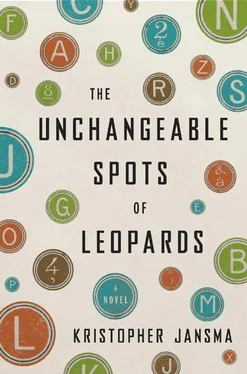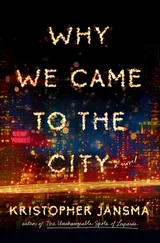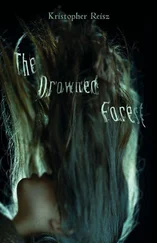Checking my watch as if I have somewhere else to be, I say, “So, I think we’re nearly done. I’d love to ask if you have any other memories of teaching me to write here, when I was young?”
He settles into a leather reading chair and lifts a glass of something dirty, brown, and surely intoxicating off a stack of books piled to serve as a side table.
“Oh, sure, sure,” he says. “You used to sit right here in this chair and write. Every morning. That’s how you make progress. Every morning. You write. Even if your leg is being chewed off by a hyena. You keep writing.”
“How old was I when I first came to visit?”
“Oh, maybe about twenty-two,” he says, staring at the ceiling fan as it drowsily completed a revolution.
“Wasn’t I maybe six or seven?”
“Yes, six or seven. And you’d sit right over there banging away on the keys.”
“So, I sat there at the desk?”
“Yes, that’s right.”
“Because a minute ago you said I was in the chair .”
The old man frowned. “Well, sometimes we’d do it that way.”
Whipping out my nib pen, I add this note to my calfskin book — along with hundreds of other similar, contradictory statements. The truth is, Jeremiah says something different every time we speak. My notebook is a garden of forking paths. Jeffrey came to Ghana because of early childhood asthma, or because his great-aunt became ill. Jeffrey’s favorite childhood book was Moby-Dick , and the next hour it was The Iliad. His first work of fiction was about an ogre named Claude. Unless it was about a Swiss chocolatier named PJ. One day certainly the former, and the next certainly the latter. The man is in his eighties and his brain is worn through, like a shirt loved too well. When his daughter calls to make sure everything is well, and he tells them, “Jeffrey’s here talking with me,” they don’t even question it.
“You mentioned yesterday that I wanted to be a librarian, as a child,” I lie, just to see if he’ll notice.
He furrows his narrow brow, which is speckled with brown spots that I’m sure must be melanomas. Will he remember? That he actually told me Jeffrey wanted to be a scuba diver? The spots swim in the fleshy wrinkles for a moment and then flatten again.
He laughs. “You liked the idea of climbing all those ladders, I think. You said you’d want to be a librarian only if they had really tall bookshelves, and ladders, with wheels.”
The fictions that Jeremiah sparked like furious flints in his neurons for decades have now caught fire and consumed the remainder of the truth. Does he really believe these things? Or does he fill in the blanks with his best guesses and hope that he’s right? Most times he’ll run with whatever I suggest, like a freshman writing student eagerly jumping into a story after being given an opening line as a prompt.
With a long sigh I stare out into the darkened jungle. Tina is right. If anything, Jeremiah is a plagiarist’s wet dream. I can put words into his mouth and he’ll never remember they weren’t there to begin with. All day I feed him fictions and listen to them echo back as truths. But still, this hollow feeling grows.
“Do you have any of my early stories?” I ask, as I do every day.
“No,” he says firmly. “Definitely not.”
It is the only answer he gives the same each time, so I am sure it is a lie.
Jeremiah takes out a knife and expertly plunges it deep into one of the yams I have given him. He works the blade through the flesh and divides it neatly in two. He stares inside of it with a childlike curiosity. I wonder if he knows that you cannot eat them raw. I wonder if I would stop him. I think that I would.
Looking back at the gentle undulations of the palm fronds, I exhale and try to think of how I could get a look around without his stopping me. Occasionally he naps or uses the restroom, and I sneak in and dig around — but I’ve yet to find anything of use. There is only one drawer in the desk that he keeps locked. If I am ever going to get it open, I’ll need to buy myself more time. Then, out on the edge of the jungle I see something moving. Jeremiah sees it, too, and he points, the knife outstretched.
“What is that?” I ask, straining my young eyes in the glare of the light.
“Is that Jeffrey?” he asks with a laugh. “What’s he doing out there?”
Blinking twice to be sure it is no mirage, I look again. There I am, creeping through the low-lying brush. My doppelgänger has ditched the tweed jacket, as I have — the heat is simply too intense. His silver wristwatch glints in the light.
“What’s Jeffrey doing out there?” he asks again. Suddenly I wonder if it is Jeffrey — the real Jeffrey — and my heart leaps into my throat. But it can’t be; Jeffrey would sooner roll around in his own feces than crouch in scrub brush.
My double is perhaps a hundred yards away, and he ducks out of sight. When I turn back to Jeremiah, he is standing with his knife pointing at me.
“If that’s Jeffrey, then who the hell are you?”
• • •
It takes an hour to talk him back down again. By the time I’m done avoiding being stabbed, I’ve gotten absolutely nothing factual or firm, and the sun is going down, so once again I return empty-handed to the Hyundai, and Kojo takes me back to Kumasi.
“How much longer will you and whatever the beautiful editor stay?” he asks me. Kojo thinks that he will sound more American if he says “whatever” as often as possible.
“Not much longer,” I say.
“The old man whatever, he is crazy, yes?”
“Yes. He is crazy.”
“I think maybe that you are crazy, too.”
“I think that maybe you are right.”
The sun has become enormous and red against the rippling surface of Lake Bosumtwi. The locals are gliding home again, having fished all day off of long wooden planks. Huge dead trees line the distant shores. The guidebook tells me that it was created by a meteorite that struck the rain forest a million years ago. There are thirty or so tiny villages around it, but no one knows exactly which are where because the lake floods whenever it rains too much and swallows any villages that are too close. Some of them have names like Pipie Number Two, because Pipie Number One was swallowed up the year before and rebuilt later. Others have no names at all.
Kojo told me once that the locals will not allow any metal-bottomed boats to touch the surface of the water, because the lake is considered sacred. The souls of the dead gather there before departing for the spirit world and say their farewells to the gods.
Now Kojo sees me staring out at the lake and purses his lips. “Whatever the fishing has not been at all good this season. Efua tells me that tonight the locals are preparing a sacrifice to whatever appease the gods.”
“What do they sacrifice?” I ask.
“A cow,” he says, making little horns with his fingers to demonstrate. “They take it out to the rock in the center and chop it all up and throw it in the water, whatever.”
“Seems like a fair trade. One cow for a good season of fish?”
Kojo shrugs. “These village peoples still believe in that whatever.”
“You don’t believe in spirits or ghosts then?”
He clicks his tongue a few times and looks around, as if worried that someone else will overhear him. “My grandmother tells me you have your thought-soul and your life-soul. When you die, the life-soul goes away. But your thought-soul sometimes it stays here for a few years. But sooner or later it goes away, too.”
I chew this over. It is growing darker and the city is still some distance away.
“Can the two ever split up while you’re still alive?”
Читать дальше











